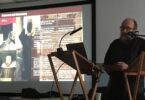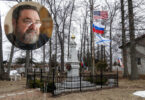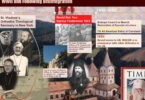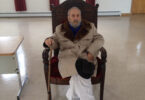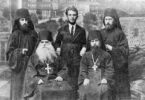“The Response of Metropolitan Antonii to the Representatives of the Episcopal Church in America regarding “Unity of Churches” was published in Russian in Vera i Razum 4 (1915): 453-469. Translation into English by Priestmonk Alexis (Lisenko) has been made possible by a generous grant from the American Russian Aid Association – Otrada, Inc. This is the first of three letters written by the future first hierarch of the ROCOR to the secretary of the Commission on Faith and Order, which in 1948 became a major component of the Worl Council of Churches.
This past December I had the honor of receiving an inquiry from the American Conference on Church Unity regarding the subject with which it is concerned, and only today, in the middle of January, have I been able to begin a response to the above inquiry, as I am always pressed by a multitude of necessary matters.
I don’t know if my view of the posed question is to the liking of the honorable reconciliation society, but I can promise with a pure heart that I will, in the first place, respond with complete sincerity, and, in the second place, with earnest goodwill and respect for those making this inquiry.
Furthermore, I must admit that having no knowledge of English, I have not been able to familiarize myself with the content of the brochures that were sent to me, but I am not postponing my response until I receive their translation since I am afraid of again losing hope for a long time of obtaining a free evening, or, more precisely, a free night, for giving an account of my convictions on this subject – those convictions which have developed in view of my persistent striving to renounce any personal feelings, and instead to adopt totally the teaching of the Holy Church, which I hope to set forth in this letter. Unfortunately, this very orientation in their thinking was not a great concern of my Russian predecessors who dealt with this issue. Rather, they yielded to the great with the Orthodoxy estimable feeling of immediate brotherly love. But precisely because of this the matter of unity didn’t move forward a single step during its entire half-century period, and the most estimable feeling of brotherly love became unrealized by both parties if we don’t take into account that undoubtedly sincere mutual amiability with which the representatives of the various faith traditions in general, and especially those of the Anglican Church, got together with the Orthodox Church. These friendly relationships, greatly pleasing to Our Savior, cannot, however, be considered in themselves as steps toward canonical unity, since it is not hatred that divides us, but the fact that we belong to different faith traditions and different churches. Love, goodwill, and sincerity are, on their part, obligatory for a Christian with respect to Jews, Muslims, and pagans – not to mention toward those believing in the Holy Gospels and the divinity of Jesus Christ. In any case, the fifty-year-old failure of the negotiations between the Orthodox and Episcopal Churches that have been peaceful and devoid of any fanaticism compels us to make the indisputable conclusion that this matter was not handled with the proper approach.
But we will begin our examination of this point with that position of both parties which does not elicit any doubt and must always be maintained when discussing diverse opinions between at least the Roman Catholic, Anglican, Old Catholic, and Orthodox Churches. I am referring to the position or thesis that all of us accept that Church and those of her beliefs which it maintained unanimously before Photius and Nicholas, or to be more precise, the faith and decisions of the seven Ecumenical Councils.
Among the truths of this ancient faith is one that is constantly neglected by honorable theologians of various faith traditions (including Orthodox ones as well) when questions of “church unity” were subject to discussion, and, what is more amazing, this truth was passed over in silence at the establishment of the Latin Unia when it was being introduced in our Little Russia at the end of the sixteenth century and, if I am not mistaken, in Florence as well at the end of the fifteenth. Meanwhile, this truth was never challenged by Orthodox theologians of the ancient Church, but was also the inalienable conviction of even all of the ancient heretics, so that both the Holy Church and heretical societies preserved their existence based upon this very truth. It was first rejected by the founders of the Reformation in the sixteenth century.
We can imagine how important it is for this truth to be held by us, who have agreed to base ourselves upon the faith of the ancient Church, if it is so deeply permeated by this dogma, against which even heretics, while rejecting the most important Christian dogmas regarding the Trinity and the Incarnation did not dare to raise any objections. Most likely, my worthy readers have already guessed that I have in mind not the eighth (the filioque) but the ninth section of the Nicene Creed. It is the more remarkable in that while not being challenged by heretics it was nevertheless introduced into the most ancient creeds, where the eighth section of our current Creed is expressed by only two words. This was pointed out to the Old Catholics by only my friend Archbishop Sergii of Finland in Tserkovnyi Vestnik.
I ask the reader to note that for the time being I am not standing upon any confessional ground and that the above statements as well as any further thoughts do not express any specially Orthodox belief, but should be elements of the heritage of the followers of all of the Churches prior to the Lutheran era, i. e the Orthodox, Roman Catholic, Arian, Monophysite, Armenian, and Nestorian Churches, and even all of the lesser and greater ancient sects that have disappeared without a trace.
I am continuing my writing on February 18, when a throat ailment prevents me from serving and receiving petitioners. During the past month, a certain kind person translated for me from English the brochures that were sent to me.
I was referring to the Church’s dogma above. I refer to the fact that the grace-filled gifts of the Holy Spirit, the gifts of the Redemption, are promised not to those who hold only known beliefs but to those who belong to the Church. Whoever disobeys her has no advantage over unbelievers: “If he refuses even to hear the Church, let him be to you as a heathen and a tax collector.” (Matt. 18:17) Notice that such a sorrowful lot threatens not only those who believe contrary to the Church but also those who, without violating the truths of faith are not obedient to the Church. The Church’s anathema casts those excommunicated from her, as well as persistent sinners, or even those who have sinned through weakness by feigning denial of Christ, or the so-called libellatici, all of them disobedient, out of Christ’s salvific flock, which remains in its prior fullness independently of the number of the faithful and the number of those fallen into schism or heresy, even if the latter significantly outnumbers the faithful, as it was in the time of the Arians, Monothelites, and iconoclasts.
The Orthodox Church has always taught, through the lips of the Holy Fathers and the canons established at the Ecumenical Councils, that outside it there is no interaction with the live of grace in Christ, and that His gifts are received within it, and that outside it there are no bishops or priests, or sacraments. Here is what Canon 68 of the Council of Carthage states:
“May Donatists, upon being anathematized for the error of the laying of hands, be received into the one Church, which as has been said, is a dove, the sole mother of Christians, and in which all of the eternal and life-creating sacraments are received salvifically, while those remaining in heresy are subject to great condemnation and execution. That which would have led them more radiantly into eternal life in the truth becomes for them more darkening and condemnatory.” The same is stated in the canonical epistle of St. Basil the Great in its First Canon: “As for the Cathari, they too are to be classed as schismatics. Nevertheless, it seemed best to the ancient authorities — those, I mean, who form the party*of Cyprian and our own Firmilian — to class them all under one head, including Cathari and Encratites and Aquarians and Apotactites; because the beginning, true enough, of the separation resulted through a schism, but those who seceded from the Church had not the grace of the Holy Spirit upon them; for the impartation thereof ceased with the interruption of the service. For although the ones who were the first to depart had been ordained by the Fathers and with the imposition of their hands they had obtained the gracious gift of the Spirit, yet after breaking away they became laymen, and had no authority either to baptize or to ordain anyone, nor could they impart the grace of the Spirit to others, after they themselves had forfeited it. Wherefore they bade that those baptized by them should be regarded as baptized by laymen, and that when they came to join the Church they should have to be repurified by the true baptism as prescribed by the Church. Inasmuch, however, as it has seemed best to some of those in the regions of Asia, for the sake of extraordinary concession (or “economy”) to the many, to accept their baptism, let it be accepted. As for the case of the Encratites, however, it behooves us to look upon it as a crime, since as though to make themselves unacceptable to the Church they have attempted to anticipate the situation by advocating a baptism of their own; hence they themselves have run counter to their own custom. I deem, therefore, that since there is nothing definitely prescribed as regards them, it was fitting that we should set their baptism aside, and if any of them appears to have left them, he shall be baptized upon joining the Church. If, however, this is to become an obstacle in the general economy (of the Church), we must again adopt the custom and follow the Fathers who economically regulated the affairs of our Church.”
The Catholics like to point out that they do not recognize the Quintisext Council, which canonized these rules, but then the Seventh Council in 787, which they recognize, canonized them once again, about which Catholic theologians constantly keep silence. However, whatever the case, they themselves maintain very firmly the teaching that salvation is possible only in the Catholic Church and they always understand unity or the Unia to denote conversion to Catholicism by those they call heretics or schismatics, i. e. the acceptance of Catholic dogmas, including the “papal infallibility,” and, furthermore, the renunciation of their former Church and inclusion into the Roman Catholic Church, although this comes along with the preservation of their former “rite,” be it Orthodox, Armenian, Nestorian, etc.
In general, I repeat that before the sixteenth century all religious societies calling themselves Christian agreed that God’s grace lives in only one faith tradition, in only one self-identified Church, while all of the others are the same as heathens and tax collectors. They are heretics, strangers to grace, whom the Church of the Seven Ecumenical Councils has never called Christians, as is evident from the 31st canon of the Council of Laodicea and from the 95th canon of the Sixth Ecumenical Council. Unanimous about the first premise of the syllogism, these communities disagreed about the second. Everyone stated and believed that only one body calling itself the Church is actually one, while the others have perished heretics. The Orthodox said that the Orthodox Church is that Church, while the followers of Eutychus said that Monophysites formed such a Church, and the followers of Donatus said that Donatists did so. Furthermore, everyone deduced the third premise by reasoning that what was possible was not our unity with other heretical churches, but the conversion of the latter to our faith, to our church, along with the condemnation of their previous faith and renunciation of their heresy or schism.
I already sense an expression of displeasure on the faces of many of my worthy readers and can hear a repetition of the words in their appeal – what haughty confessional self- confidence! Such a cruel anathema! Forgetfulness of Christ’s love for man! It’s too bad if I failed to preserve trust in my promise to be guided specifically by brotherly love and sincerity and to call things by their proper names and not to avoid questions instead of solving them as was done at most interconfessional congresses. At any rate, I earnestly ask you to fix your attention upon the fact that for the time being I have not spoken out as a son of the Orthodox Church and have not presented its special teachings, but have expounded the principle which is common to all Churches calling themselves Christian, citing, for now, the resolutions of the Ecumenical Councils as a particular example of persuasion common to all who have called themselves Christians for the entire fifteen centuries after the Birth of Christ, starting with the Savior Himself and the epistles of the Apostle John. A Catholic, a Monophysite, or an Armenian who is consistent in his confessional convictions will say to me, “You are correct in expounding the general basic principle of the Church, but doing this, as a follower of Cyril, Tarasius, and Photios, you are denying yourself and your Orthodox Church hope for salvation since it is anathematized by our Church, the only one that saves.”
This must be said by the followers of all who disagree with the teachings maintained by me and my Church and of the churches which separated into definite bodies before Luther. Lutherans and other Protestants are a different matter. Of course, they cannot claim that their church existed unwaveringly from the apostles to the present days while other faiths and churches fell away from their one true faith and church. They cannot do this because there was no Lutheran faith and Church before Luther, no Reformed Church before Calvin, and so on. They have to establish a point of view that although such a church did not exist as an organized community and neither did such a teaching as a clearly expressed symbol which was unwaveringly contained in such a community, the ideas of Lutheranism or Reformation comprise the essence of the New Testament, which had not been understood by the early Greeks, Syrians, and Slavs, and that the teaching on the infallibility of the Church should be renounced. Faith should be maintained instead in the invisible Church, which has very little in common with the Orthodox Catholic Church of the Seven Ecumenical Councils, as well as with Monophysites, Monothelites, Gnostics, and so on.
Do truth-loving Anglican Episcopalians maintain this viewpoint? No, as far as I am aware, they do not doubt the perfectly unblemished state of the faith and holiness of the Church of the first eight centuries. So what is their attitude toward the Church-wide teaching on the Church presented above? Alas, this basic and most important issue is intentionally avoided at congregational conferences, and, I would add, it’s like a reminder of the rope in a room where a hanging took place, if I wasn’t wary of a trivial comparison. By leaving things unsaid and by making hints they try to establish a single idea sounding exceedingly false in its open proclamation, which the Roman Catholics just as insincerely set in motion in the Middle Ages when they raised the issue of the Unia. Here is the approximate gist of this idea: the distinctions of European faith traditions are not at all similar to the heresies of the early era. Then there was the Church and there were heresies, and later the Church itself divided up in 1054. The relationship between her Eastern and Western parts is not one of a true Church and excommunicated heretics but as two parts of a universal Church. This idea (or rather, this nonsense) is very popular and is advanced even in our school textbooks, where one can find the chapter entitled “The Division of Churches.” It is very much to the liking of European secular society, which is of one mind in its general indifference to religion and religions and is very happy that it can establish friendships and even kinship (contrary to injunctions of the Ecumenical Councils), disregarding barriers between faith traditions. But how can this viewpoint be reconciled with history and with the actual conviction held by churches? First of all, in 1054 the Roman Church excommunicated the Eastern Church, which excommunicated the Roman Church as well. Each church proclaimed itself to be the Church and the excommunicated one to be heretical and schismatic. Each Church made no distinction between previous heretics and this ex-communication. For when it excommunicated the Monophysites 500 years before this event, the Church excommunicated the entire Alexandrian Patriarchate, which was immense in the area and in the number of bishops and laity, and possessed almost more religious energy than the other patriarchates. True, the small Greek colony in Egypt that was supported by the civil authority received and to his day has its Orthodox patriarch, but this was an authority in partibus infidelium, which was maintained for the sake of the fullness of the number of patriarchal thrones, and the followers of the local popular Monophysite Church and their patriarch called the members of this colony Melkites, identifying them as royal officials of the official faith.
The Roman Pope with his church did exactly the same with regard to the Eastern patriarchs 200 years after their mutual ex-communication when he appointed Roman Catholic patriarchs for Constantinople, Alexandria, Antioch, and Jerusalem. Such Latin patriarchs exist in partibus infidelium to this day, which expresses the conviction of the Roman Catholic Church that the Greek patriarchs are not legal heirs of the ancient patriarchs, but are heretics and pretenders. The Romans teach this to their seminarians, and when it comes to Protestants they refer to them with all determination in their catechisms that are taught in high schools as being the most harmful heretics, more dangerous than Arians and Nestorians. Luther is named among all of the ancient heretics as the most dangerous and evil of all of them.
We are told: don’t you receive Latin priests converting to Orthodoxy in their present ranks? Yes, and we do so with Latin and Nestorian bishops, as well as with Armenian ones. The latter is based on the Seventh Ecumenical Council, and the others on the Russian Local Council of 1667, while the Greek Churches, according to the Local Council of 1753, receive Latins and Protestants through threefold immersion, as they do with Jews, and, if the newly baptized was considered to be a priest by either group and was recognized to be worthy of such a rank by the Orthodox, he was ordained to the diaconate and to the priesthood. However, the Greeks receive those of the ancient Armenian and Nestorian heresies in their existing rank. The Russian Church maintained this entire practice until the 1667 Council, when it changed its practice with respect to westerners, due to the large number of Uniates converting to Orthodoxy, in this way following the first canon of St. Basil the Great regarding the substitution of the first rite of conversion (baptism) by the second (chrismation) or even by the third (penance) when this is needed “for the conversion of many.” I wrote regarding what viewpoints guided both the early and contemporary Churches, the Greek and the Russian, in my Circular Message To The Old Believers Separating Themselves From The Church, which follows. In this response I bring in these facts in order to demonstrate that the Orthodox and Roman Catholic Churches place no qualitative distinction between what secular language calls “other Christians” of Europe and ancient heretics, for when the former express their wish to join the Church Roman Catholics receive them through the same rite as they would Arians, Nestorians, Monophysites, etc., while Protestants, as being even more distant from the Church than the abovementioned heretics, are received through chrismation. Moreover, both have to solemnly renounce their previous church, their errors, and enter the Church as repenting heretics.
I earnestly entreat readers not to grumble against me. Again, I am not saying that I like or do not like this. I am pointing out only the objective state of the matter, and, if the impossible were to take place, i. e. if I were suddenly to become, for instance, not a Christian but a convinced Talmudic Jew, in the process of clarifying the issue under consideration, I would have to say the same regarding unity as was said above – if I didn’t wish to lie and conceal the practical truth.
If it is being concealed by Roman Catholics, and being left unsaid by the Orthodox, one might think that both are not facilitating but are impeding our rapprochement. True, a doctor can heal a sick person without informing him about his illness, but uniting faith traditions while concealing basic dogmas of each is a Sisyphean task while hoping to attain the truth through deceit can be done only by those who, like Pilate, do not believe any truth, and treat events and ideas from a bureaucratic viewpoint. Alas, in constitutional Europe and in Catholic absolutism this viewpoint, if it has not yet squeezed out, threatens to squeeze out eternal divine truths completely, truths that are not subject to fashion and the pride of people and nations, but demand the subjection of all other principles of personal, social, national, civil, and earthly life.
The persistent but unconvinced attempt to establish a qualitative distinction between the events of 325, 381, 431, 451, 553, 680, and 787 on one hand and of 1054 along with those of the Reformation on the other, found an eloquent champion sophist in the person of the talented Russian philosopher Vladimir Soloviev, who had unfortunately become an absolutely inveterate liar.
Our philosopher decidedly did not base his paradoxical thesis on anything and completely overlooked the fact that if the Orthodox recognize the Seven Ecumenical Councils the Roman Catholics recognize twenty, the last of which was less than fifty years ago, and that they recognize the infallibility of the Pope as a dogma and all who reject him are excommunicated and regarded as heretics. Furthermore, according to Soloviev, it follows that St. Ireneaus of Lyons had no right to write Against Heresies and that Nicolaites, Gnostics, Manicheans, Ebionites, and many others were not heretics, since in their day there were no Ecumenical Councils, and no other body could condemn them. It is apparent that the insincere attempt by our philosopher to place a qualitative distinction between ancient ex-communications and contemporary ones lacks any rational basis.
I am reminding my readers for the third time that I have not yet accused any Church, I have not pointed out any advantage of the Orthodox Church, nor have I brought forth a single proof that this is the true Church. I am merely proving, and I believe irrefutably, that among the faith traditions existing in Europe – or rather among the churches and theologians who are aspiring toward canonical unity – one certain Church is the true one of Christ and is that one universal apostolic Church about which the Nicene Creed teaches, while the other communities are heretical. There is no justification to single out European religious communities into some other position with respect to each other as compared to the religious communities of Asia and Africa which broke their connection with the Orthodox Church back in the early days. We can argue and research conscientiously where we can find the true Church from which all other faith traditions and churches split off, bringing about their ruin, but to say that the Church split up, that it lost its unity in the ninth, eleventh, or sixteenth-century means not believing Christ, who said, “I will build My church, and the gates of Hades will not prevail against it.” (Matt. 16:18) It means not believing as the ancient creeds and councils teach us – in One Holy Catholic and Apostolic Church. It means not recognizing the Apostle Paul, who exclaimed, “Is Christ divided”? It means flying in the face of that inalienable belief of all Christians that Christ’s Church will remain one and unwavering for eternity. And although heretics, schismatics, and deep-rooted sinners will constantly fall away from it, this will never reduce its grace-filled authority, its holiness won’t lessen, its sacraments won’t be stopped, and its teaching won’t be silenced. Therefore, the Church can never be called “weakened and constrained by disagreements”, only saddened by the falling away of heretics. Perhaps your free-thinking goes further, and you are inclined toward the Protestant teaching about the invisible Church, which rejects the authority of the Ecumenical Councils and the importance of Tradition common to all churches? If so, then, of course, all of the aforesaid means little to you. But I assumed that you, as well as the Old Catholics, recognize the authority of the ancients, or, as you express it, “undivided Church” (I am convinced that it is such to this day and will remain as such). And so, not saying anything about the superiority of my faith tradition over others I pointed out how according to this point of view canonical unity should be sought among religious people of different opinions who believe the same way as did the holy apostles and martyrs. Either one should seek where the true Church has been preserved and belief in her comes through the first, second, or the third rite, or, having acknowledged that such a Church is only in that faith tradition to which you have belonged up to now, to earnestly call into it all who had not belonged to it before, along with a renunciation of their heresies and their reception into your community through either baptism, or chrismation, or penance, depending on the nature of their previous heresy.
Tertium non datur, and if you wish or seek a third solution, that in itself will be a rejection of like-mindedness with the ancient Church and with the Church of the time of martyrs and councils.
“You will never attain unity this way,” my worthy readers will say to me. “But what have you attained through other means?” I will ask them. “I love Eastern Orthodoxy,” writes a most likable Anglican theologian, “but of course, as a descendant of a certain dukedom, I will never deny the faith and church of my ancestors.” It’s a good thing that the contemporaries of the holy apostles – the Jews and the Greeks — didn’t think that way. Otherwise, there wouldn’t be Christians or Christianity in the world. It’s a good thing that the audience of St. Gregory the Theologian didn’t think that way, for otherwise, the Greeks would have remained Arians forever. So how will we respond to the declaration of our English friend? Alas, here is what we will say: “Even if the faith and church of your ancestors were the true Church about which I am writing it’s impossible to be saved in it with such thoughts. In matters of faith, In matters of salvation ancestors, nationality, and especially the pride of the European gentleman are those heavy weights which will drown even an undamaged boat in the sea of life, while a boat full of holes won’t go anywhere except to the bottom. If you have decided to search for the true Church you should, first of all, make the decision to renounce everything for its sake except for your eternal salvation. Otherwise, you will not acquire it, and even if you did acquire it from your very birth you will perish in it, as did Ananias and Sapphira. God commanded Abraham to bring him his only son as a sacrifice, and only after such decisiveness did he promise him that all nations of the world would be blessed through his seed. The Kingdom of Heaven is like a pearl for the acquisition of which a wise merchant sold all he had, and if it represents for our contemporaries merely a certain moral comfort among other comforts of life they will not gain from faith, even if they turn out to be sons of the one true Church.
It is here that we find the source of the spiritual illness of the heterodox and it is from here that healing should begin before they discover true faith in Christ.
We will say more about this when the time comes, but for now, allow me to rid contemporary theology of a certain false idea that has become exceedingly widespread over the past 100 or 150 years. It appears very enticing, but is closely connected to the contemporary weakening of belief in life beyond the grave and with the contemporary view of religion not as life’s purpose but merely as a useful additive to societal improvement. Roman Catholics and Protestants see this idea in somewhat different ways. I have in mind our contemporaries’ hope that all heresies and schisms will cease and all who call themselves Christians will make up one flock of one shepherd, whom the Catholics see as the Pope, and the Protestants see as Christ. It is in this sense that both interpret the Lord’s words, “That they may all be one; even as Thou, Father, art in me, and I in Thee, that they may be one in Us.” (Jn. 17:21)
What is there in common between these moving words of Our Lord and the hopes of our contemporaries? What sort of artificial interpretation has to be given divine thoughts and words to take them is such a sense? Was it not for His listeners that Our Lord spoke? Were they able to draw out of these words of His, or out of the words about one flock and one Shepherd, the following complex combination of events? The Savior will gather His flock, His first generations will maintain unity, then some will fall away – but they do not worry the Lord. The divisions will start in the flock itself (the difference between falling away and causing divisions remains totally incomprehensible) and now this worries the Lord, when His entire flock consists of twelve people. He is already worried about what will happen in a thousand years. The difficult division will also last a thousand years, and likely longer, but later they will cease and His followers will form one flock and will be one as He and His Father, for – how many years? More than a thousand, or less? For He spoke of the Second Coming not allegorically, but unambiguously.
You can see how little sense God’s words make when they are interpreted in this way, if they are taken in their historical reality rather than as a pleasant additive to our era, to our, so to speak, housekeeping. Do you think that the Lord is speaking about this to rid Europeans of their unwelcome depression while contemplating their religious rootlessness and to reassure them with the hope that it will cease on its own? Isn’t the other meaning of God’s words, the actual one, clear?
Here is this meaning. The Jews resist God’s teaching. His disciples are alone, but there will be many of them, and not only among this obstinate lot, who had been His chosen people but from another quarter there are those intended for the salvation of their souls – those are the gentiles. They will also enter into Christ’s realm. And so – His current followers, the apostles, those he will draw to Himself when he will be ascended from the earth (Jn. 12:32), and the pagans, converted through teaching, along with their children and grandchildren, all of them will be included in one flock with Christ. When and where will this happen? Where will all of them be together? The Apocalypse gives an answer to this: “The Lamb who is in the midst of the throne will shepherd them and lead them to living fountains of waters. And God will wipe away every tear from their eyes.” (Rev. 7:17)
The words of Christ’s prayer refer to the same future life, not to the present one. Is it really possible to liken like-mindedness and even brotherly love to the unity between the Father and the Son? Can the lofty aspirations of the last prayerful wishes of the Redeemer be abased in that way? He is praying for His disciples and for their unity, which is not administrative or having to do with their faith practices (that had already been realized), but for the total unity of their love that nothing can ruin and for the agreement of their thoughts. He is praying that they and the Jews and Greeks (of all generations, of course) who came to believe in Christ for their sake would make up that single “new Man” in whom their unity, (i. e. the unity of all believers with the apostles (meaning that it is outside of time) would become like the unity of the Persons of the Holy Trinity. Where and when will this take place? Of course, in the future life for saved persons, and not on earth. But the thinking is different for those for whom the future life is the same kind of kingdom of shadows as it was for pagan Odysseus, if it’s not an empty sound.
Alas, heresies and divisions will not only not cease on earth, but will the Son of Man, when He comes, find faith on the earth? (Lk. 18:8) Then the gospel will be preached to all the nations, but only as a witness, i. e. as a rebuke to them. (Matt. 24:14) But they will not believe the Gospels and will commit the abomination of desolation in the holy place (v. 15), and the son of perdition “who opposes and exalts himself above all that is called God or that is worshipped, so that he sits as God in the temple of God, showing himself that he is God. (2 Thess. 4)
Contemporary theologians have tried to forget all of this, having been carried away by the superstition of progress, weaving it in with Darwin’s nihilistic evolution, and most important, having little belief in the Word of God and more belief in contemporary prejudices.
Of course, these thoughts of divine revelation, while they remove from us the certainty that all heresies will cease, do not take away our hope that the current divisions between those calling themselves Christians will be replaced by their unity in the true Church through the renunciation of their errors and from any kind of pride. But it should be remembered that this won’t happen on its own, but only with humility and sincerity. Moreover, they should start with the former rather than with the latter. They should check not only those dogmas of faith which are disputed by various faith traditions, which is very difficult to accomplish without partiality and prejudice. They should start with something else. They should compare the contemporary understanding by Christianity itself of the very essence of our salvation, our moral perfecting, with the teaching of, as you express it, the “undivided Church”, and see how far the contemporary understanding of these truths has stepped away from it – and be horrified.
Then those who understand real Christianity will not regret parting with their folksy speech patterns, family prejudices, and school-bred ideas. They will go to Bethlehem as the ancient astrologers, and, together with the shepherds who glorified Christ, will venerate His manger.
If my readers wish to find out in what way the contemporary European understanding of Christianity departs from that of the early Fathers we will, with God’s help, return to this theme, but for now we will wish them total success in at least gradually drawing together with each other, i. e. between one faith tradition and another, and a third and fourth one in understanding the truths revealed to us by Our Savior.
LINKS
Second Letter of Archbishop Anthony Khrapovitskii to Robert H. Gardiner
Third Letter of Archbishop Anthony (Khrapovitskii) to Robert H. Gardiner



